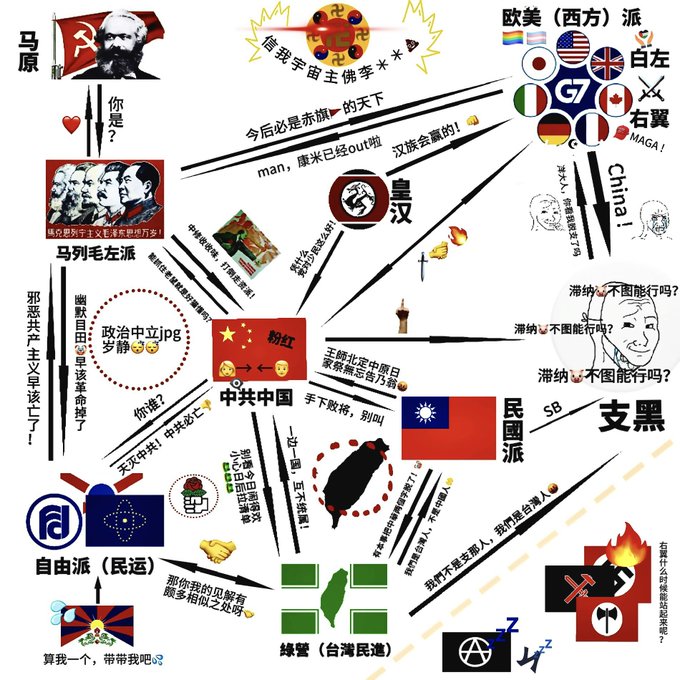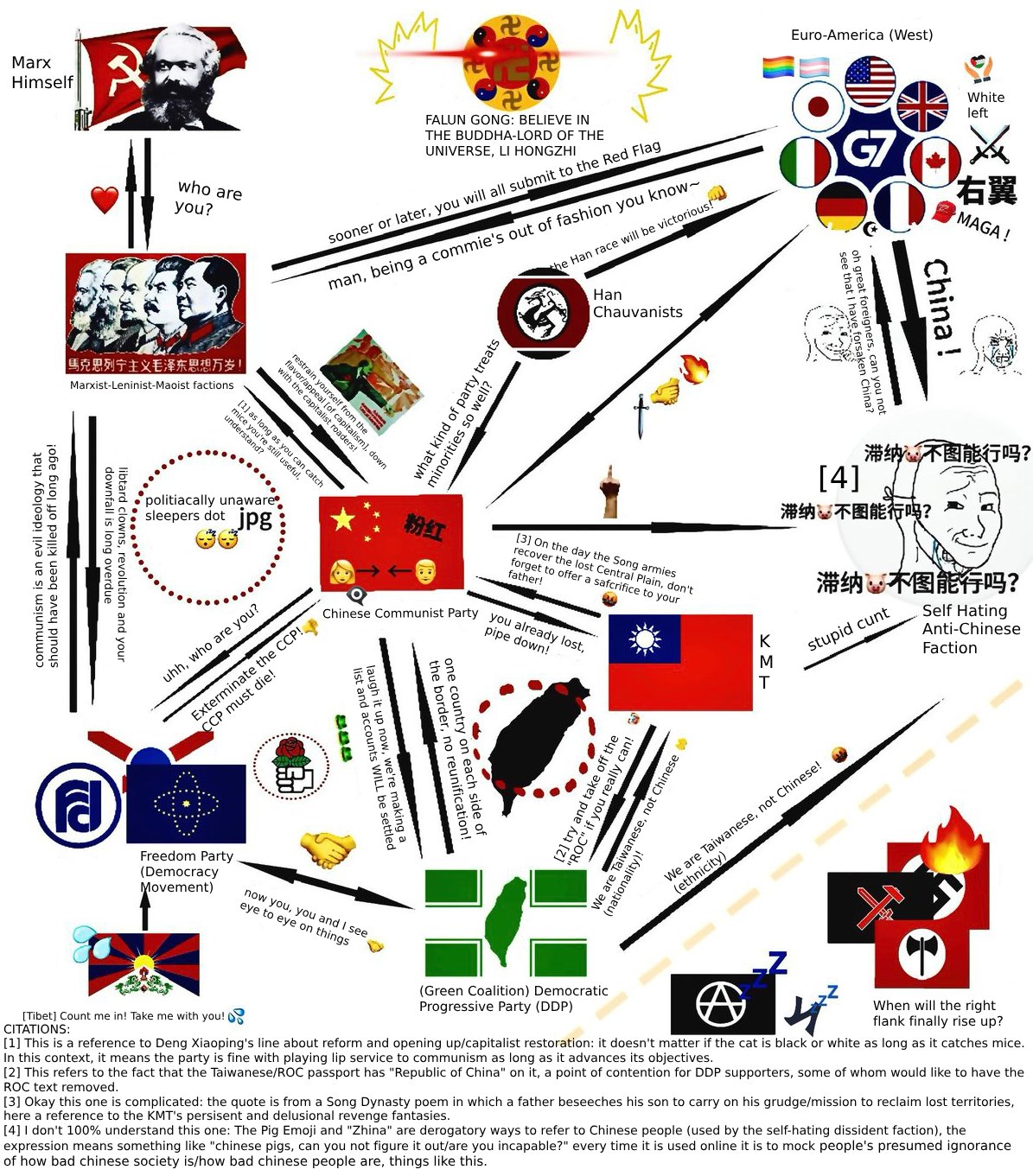

Why waste time scrounging up both a sock and a half-brick when a single cast-iron frying pan is already more than adequate for any imaginable problem, plus fairy incursions? Typical PMC wizardry, always trying to overcomplicate magic.


Why waste time scrounging up both a sock and a half-brick when a single cast-iron frying pan is already more than adequate for any imaginable problem, plus fairy incursions? Typical PMC wizardry, always trying to overcomplicate magic.


Malala could have had some vaguely “left” sympathies when she was attending that Trot summer camp 2012 as a 16 year old. But I doubt that she has any kind of real socialist convictions left in her as a 27 year old adult, when she’s been safely ensconced within Western elite liberal “progressive” institutions for more than a decade, and is now so financially secure and socially accepted within that crowd that she’s co-producing suffragette Broadway musicals with the Hilldawg herself. https://archive.ph/rURQV
She’s not a comrade or any sort of revolutionary. At most she’s a safe brown “activist” who’s ultimately compatible with Western capitalist hegemony.


Was making a reference to Overlord: an overworked salaryman from near-future cyberpunk Japan wakes up in a fantasy world as his VRMMO player character (i.e., the skeleton in the pic), and alongside with the evil NPCs created by himself and his former guildmates (they were a guild dedicated to roleplaying evil grotesque monsters) proceed to take over the world using the power of fantasy violence. Because the MC and his NPCs are absurdly over-leveled compared to the fantasy world natives, the casualties are incredibly one-sided and genocidal.
The show’s a bit above average compared with other isekai, as it balances out its shameless powerfantasy with some decent comedy of errors and quite some effort being put into the worldbuilding/power system. It has a fair amount of typical anime horniness though, though I think it’s relatively tame compared to the lowest common denominator isekai slop.


 She’s just foreshadowing her pick for Secretary of Defence.
She’s just foreshadowing her pick for Secretary of Defence.


I assume OP is referring to Kamala’s maternal grandfather, P.V. Gopalan?


Incredible political schizoposting by some mainland Chinese “pro-establishment right-wing” Huey Longist (???) on twitter:

English translation:

After the revolution Macklemore gets to be appointed commisar for mini golf affairs, but only after he undergoes brief reeducation for his petit-bourgeois tendencies
 : Stupid commies, don’t you realise that violence never achieves anything? Miss me with all that talk of revolutionary collective action; real progressivism is when you vote for nice, intelligent Democrat politicians so that they can bestow upon the American people positive socioeconomic policy changes like NAFTA and the Affordable Care Act.
: Stupid commies, don’t you realise that violence never achieves anything? Miss me with all that talk of revolutionary collective action; real progressivism is when you vote for nice, intelligent Democrat politicians so that they can bestow upon the American people positive socioeconomic policy changes like NAFTA and the Affordable Care Act.


Unfortunately, I don’t think there’s ever been a full translation of Tjokroaminoto’s Islam dan Sosialisme into English. :-(
In my English copy of Syed Hussen Alatas’s Islam and Socialism (which is itself a translation from Malay to English) from which I copied the above extracts, the footnotes say that the English translation of Tjokroaminoto’s words being quoted are Alatas’s own translation. In fact, I think the only extant full translation of Tjokroaminoto’s book is from the original Indonesian to Malay.


Hey I’m glad that you find this interesting! I’m not really subject area expert on Islam or Islamic finance; just picked up a few things here and there from studies and from work. Honestly a bit surprised that I have this much to say about it, especially from the angle of Marxism.
And don’t worry about convincing your hypothetical Muslim interlocutor about the truth of the immortal science or whatever; even if they’re not convinced into immediately converting to secular communism, if they truly are arguing in good faith and with intellectual curiousity, they’ll probably arrive at some general position about their own religious belief and practice that would lead them to do some good in the world.
Go get some sleep! 


Ultimately I think that Islamic jurisprudence was a product of its time and, at that time, critique of the economy in a fully-realised way didn’t exist.
More precisely, it’s that the Quran and the hadiths - the written sources - that were a product of their time. Jurisprudence - if understood as the legal theorising and interpretation being done upon prior texts - is a continuing process that’s still ongoing today, and it’s definitely here where modern forces of global capitalism have influenced modern Muslim legal theorists into moulding the orignial texts into the current industry/academic edifice that’s labelled as “Islamic finance”. So yeah, technically speaking, it’s not that “Islamic jurisprudence was a product of its time”, but “is a product of its time”: that time being present-day global capitalist hegemony. (Sorry, I’m probably nitpicking here; I know you said you want to avoid going into the weeds with interpretation and real-world application. I think I would agree generally with most of what you’ve written above; just taking the opportunity to air out and give some structure to a few thoughts that had been jangling around my head for some time.)
I’d be fascinated in hearing what a Muslim would have to say about how they think Muhammad would respond today if he saw how private equity firms like BlackRock are grossly distorting the property market and squeezing every last penny out of people who have no other options for housing available. Something tells me he wouldn’t just be like “Alright guys, this arrangement is totally fine as long as you don’t jack the rents up too high, okay?”
True, and I’m aware that there is some existing discourse/scholarship by Muslims on the Islam’s compatibility with socialism as a political movement. Syed Hussein Alatas’s Islam and Socialism provides a good overview, I think. One bit I think is particularly relevant to the concept of riba is where Alatas outlines the position argued for by Oemar Said Tjokroaminoto, who was a nationalist figure in pre-independence Indonesia; Alatas suggests that Tjokroaminoto, in trying to prevent a spilt between the Islamic moderates and radical Marxists in his party (which eventually happened and led to the the radicals joining the Communist Party of Indonesia) attempted a theoretical reconciliation of the contradictions between Islam and socialism (pg. 62-4):-
In 1924, Haji Omar Said Tjokroaminoto, the leader of Sarekat Islam, then the biggest political party in Indonesia, published a monograph (113 pages) on Islam and socialism. (…) It arose out of the need to counteract communist propaganda. Tjokroaminoto’s party, the Sarekat Islam, was seriously infiltrated by communist elements which led to a split in 1923.
(…)
Regarding state ownership of the means of production, Tjokroaminoto suggested that this was Islamic. In the time of the Prophet, the state owned and acquired land. It is interesting how Tjokroaminoto linked Marx’s theory of surplus value and its expropriation by the capitalists to Islam. The Islamic prohibition of usury, according to Tjokroaminoto, is the same as a prohibition against the immoral capitalist expropriation of surplus value.’ The reforms carried out by the Prophet were thoroughly in the spirit of socialism. The instances cited by Tjokroaminoto are the following, in his own words:
“With the law of zakat Islam intended to make it obligatory for the rich to spend on behalf of the poor. In the time of the Prophet Muhammad (peace be upon him) land was the greatest source of livelihood for the working class, and as I have explained earlier, land was owned by the state. Small industry from pre-Islamic times was run by the poor or the slave for the sole profit and welfare of the owners, most of whom were harsh and oppressive. Before the advent of Islam, those who worked in industry were extremely looked down upon by the aristocracy, while the slaves who functioned as labourers were treated as animals by their capitalist masters. The Prophet Muhammad (peace be upon him) immediately raised the status of labour and workers. Though he descended from the highest Arab aristocracy, he worked as a trader before his preoccupation as a Prophet took up his entire time. As a recognized prophet he became ‘the spiritual and worldly ruler over Arabs and the Muslim territory, but he mended his own clothes and shoes. The biggest step he took in the direction of industrial socialism was when he raised the status of the slave to that of the free man. The slaves were given rights which they never had before. The slaves were made fellow workers; they were given positions of command in the army, or to become heads of other undertakings, while in yet other spheres as in the family, they became members of the family who treated them as animals before the coming of Islam. That being the case, the slaves took part in sharing the welfare and the profit of their masters. Truly, the step taken by the Prophet Muhammad (peace be upon him) to improve the condition of the working class during his time, was unsurpassed in greatness in the economic history of the world.”
Tjokroaminoto was not blind to the fact that during the last thirteen centuries, despotism, autocracy and egoistic materialism had chiselled at the foundation of Islam. As long as the Qur’an is still with us, the ideal of democracy and socialism in Islam shall remain alive. He said: “If we Muslims truly understand and practise the teachings of Islam, we cannot avoid becoming a true democrat and a true socialist.


Islam gets an honourable mention because of their fairly strict prohibition on riba, which is like usury except a souped-up version of it (which is more or less enforced in Islam, unlike most forms of Christianity)
With how Islamic banking/finance is currently widely being practiced, can you really say that prohibition of riba is being strictly, or even “more or less”, enforced in contemporary Islamic practice? I think the best that can be said is that the prohibition is observed in form, but not in spirit. In my very limited experience (please take all this jabbering with a ton of salt; I’m neither Muslim myself nor any sort of specialist in Islamic finance) with Islamic financing on the legal side, it largely seems to involve private or sometimes state-owned financial institutions using profit-sharing, joint-venture, and/or commodity sale contracts to imitate the practical effects and consequences of conventional fixed or variable interest financing instruments while still formally complying with the riba prohibition. Essentially, the bank’s technically not earning any interest off the principal; just “profit” from commodity sales/company shares. Seems to me that what’s been done is just a thousand convoluted and fancy ways of ensuring that the surplus value reaped by the bank is not vulgar “interest”, but some other technically non-prohibited form of (or names for) extracting value from the labour of others, thus reducing the practice to basically a matter of formal compliance without any application of its underlying or originally intended principles - i.e., the moral idea that any financial exploitation of others (in other words, capitalism) inherently corrodes your soul.
I also can’t see any real difference in material interests between Islamic and non-Islamic financial institutions: both are typically just extreme concentrations of financial capital, privately owned, within capitalist societies motivated by their own reproduction/perpetuation/expansion through systemic extraction of surplus value through investment in market commodities and productive concerns. In the worst case scenario, I can see how leftists fixating on riba as a theoretical concept leads to idealist mystification of productive/property relations, frustrating the materialist analysis of that which is central to Marxism.
Basically, it’s all like this mostly because of (like you said) the destruction of pretty much all 20th century efforts towards socialism in Muslim-majority countries (except Libya? But I’m not aware whether Gaddafi promoted Islamic financial principles), resulting in those Muslim-majority countries being dominated by reactionary politics, leading to this utterly debased version of Islamic finance being the global industry norm.


Wait that makes communism sound cool and metal as fuck.
Part of me kinda wish we lived in the fantasy world these people say they believe in, where instead of reading theory and attending party meetings, communists are actually mighty wizard-shamans who gain esoteric mystical powers through constantly doing gay orgiastic rituals, and then use it to summon spirits of the ancestral dead in order to perform crazy magical feats like making entire nation-spanning train networks appear out of mid-air or transmuting arid deserts into dense forests.
ProletariatPierrots of Oppressed Nations